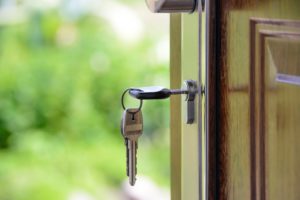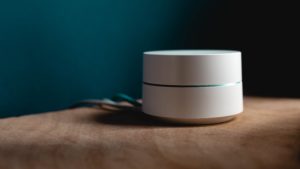7 Minute Read
It’s midnight and you’re making your way back home from a Halloween party that had way too many clowns and not enough apple cider. The night air is crisp and and uncomfortably still. Your house is about a block away, and you’re beginning to regret that last drink of “Witch’s Brew” as you awkwardly rummage through your belongings to have your keys ready to unlock your front door. You could’ve sworn you took your keys out of the festive, jack-o’-lantern embellished key dish, but now you’re beginning to question your memory. It’s getting colder and you’re now right outside the door to your home. It’s dark. It’s freezing. You’re exhausted and a tad dehydrated. However, your keys are nowhere to be found. Either you’ll have to walk another mile, round-trip to get your keys back from your friend’s house or you’re going to have to make a bed out of the front porch. In any case, this is a nightmare. One might even say it’s a scenario equivalent to a horror movie. A situation, you realize, that could have been avoided as you text your friend, asking if they see your keys among the pile of everyone else’s house and car keys. “If only my phone was my key,” you sigh, just before your friend confirms that your keys are, in fact, still sitting exactly where you left them.
Beyond the cheesy anecdote and attempt at making mobile access control relevant during the spookiest time of the year, there’s a feeling that most of us have felt in the pit of our stomachs when we realized we misplaced our house keys. There’s also skepticism about the new products and technology consumers are beginning to use to fortify their homes and offices. With the release of mobile access control products like smart locks and mobile key readers, many questions have come up. Such as: “How secure is it? Isn’t it connected to the cloud?What happens when your phone dies- how do you gain entry to your home or office when that happens?” All of these questions and concerns are valid, if you’re using a lock with hackneyed and vulnerable software. The fact of the matter is that mobile access control isn’t scary, and can even provide stronger security and more convenient access than traditional physical access control products. Here’s why.
1. The right mobile key software offers stronger security than the traditional lock and key.

Because of its ties to the cloud, most people question the security of mobile access control. However, if the lock is powered by software that uses tried and true methods of encryption, hacking into the system’s cloud should prove to be a nearly insurmountable feat. On the other hand, with the traditional lock and key, your home or office could be at much greater risk to intruders and bad actors. Traditional locks are susceptible to lock picking, lock bumping, and other ways burglars will find to circumvent the thousand year old piece of security. The other downside to the traditional lock is that it’s a bit rigid in the amount of options you have to recover access to your home or office. If you lose your keys, you’re stuck with having to pay a locksmith to rekey your lock, and having to print more keys. With RFID you have more options available to you. It’s much easier to reissue an RFID Key card than it is to rekey a lock, but as far as security goes you’ll find that key cards are no safer than traditional locks.
Thanks to several devices that hackers can find online, the security that RFID key cards are supposed to provide is relatively easy to dupe. With certain devices, if a bad actor wants to enter your office or (in some cases) your car, they can simply draw upon the signal that the radio-frequency is emitting, and with the device, copy the data onto their own key card. This is just one way that hackers can create vulnerabilities in RFID/ Key card access control systems. Moreover, both forms of physical access control don’t allow the same level of control and supervision over the system as mobile access control.
2. Mobile = More Control and Round the Clock Monitoring
With mobile access control, you can keep a better eye on your home, office, and car. Most mobile access control systems, take the Kwikset Kevo as an example, allow you to check on the lock status of the door (whether it’s locked or unlocked) and track the history of who has accessed the door and when they accessed it. Moreover, with mobile access control you have the ability to manage and govern when individuals can enter your home or office from any remote location, either by a mobile app or a web application. You also have more than one way to enter your home than through your phone. Most smart locks and readers work with key fobs and cards, so if you ever find yourself in a situation where you don’t have your phone on you or your battery is dead, you always have a backup plan. With a traditional lock and key, you’ll be lucky to know who has a copy of the key to your home and/or office, especially if you have given a friend, family member, or dog walker a key to your home. With mobile you also have the ability to connect more supplemental pieces of security, which can also offer you a greater scope of control over your doors.
3. Mobile = Opportunity

It’s been about half a decade since the first smart lock was made available to consumers. Since then several other smart, connected devices like Ring doorbell, Nest Thermostat, Philips Hue Lights, and Amazon’s Alexa have integrated with smart locks to give homeowners and building managers more control over their properties. Imagine coming home from a lively, yet tiring Halloween party, unlocking your door with a simple touch to the deadbolt, and as you come home your smart thermostat adjusts to a comfortable 72 degrees, and your lights turn on to give you enough visibility to see where you’re walking at a nice, dim, night setting. Meanwhile, your connected security camera keeps a watchful eye on your front door. This same kind of experience (maybe minus the night setting) can be applied to your offices and at some point to your cars as mobile access control becomes a more mainstream means of physical access control and creating personalized, connected experiences.
Never Fear Being Locked Out
Most of us have experienced the haunting nightmare of misplacing our keys. However, now we don’t have to as several solutions, like UniKey’s mobile access control platform, have been produced to make sure we never have to feel the chill of being locked out of our homes and offices again. To learn more about the benefits and opportunities mobile access control can provide, visit unikey.com